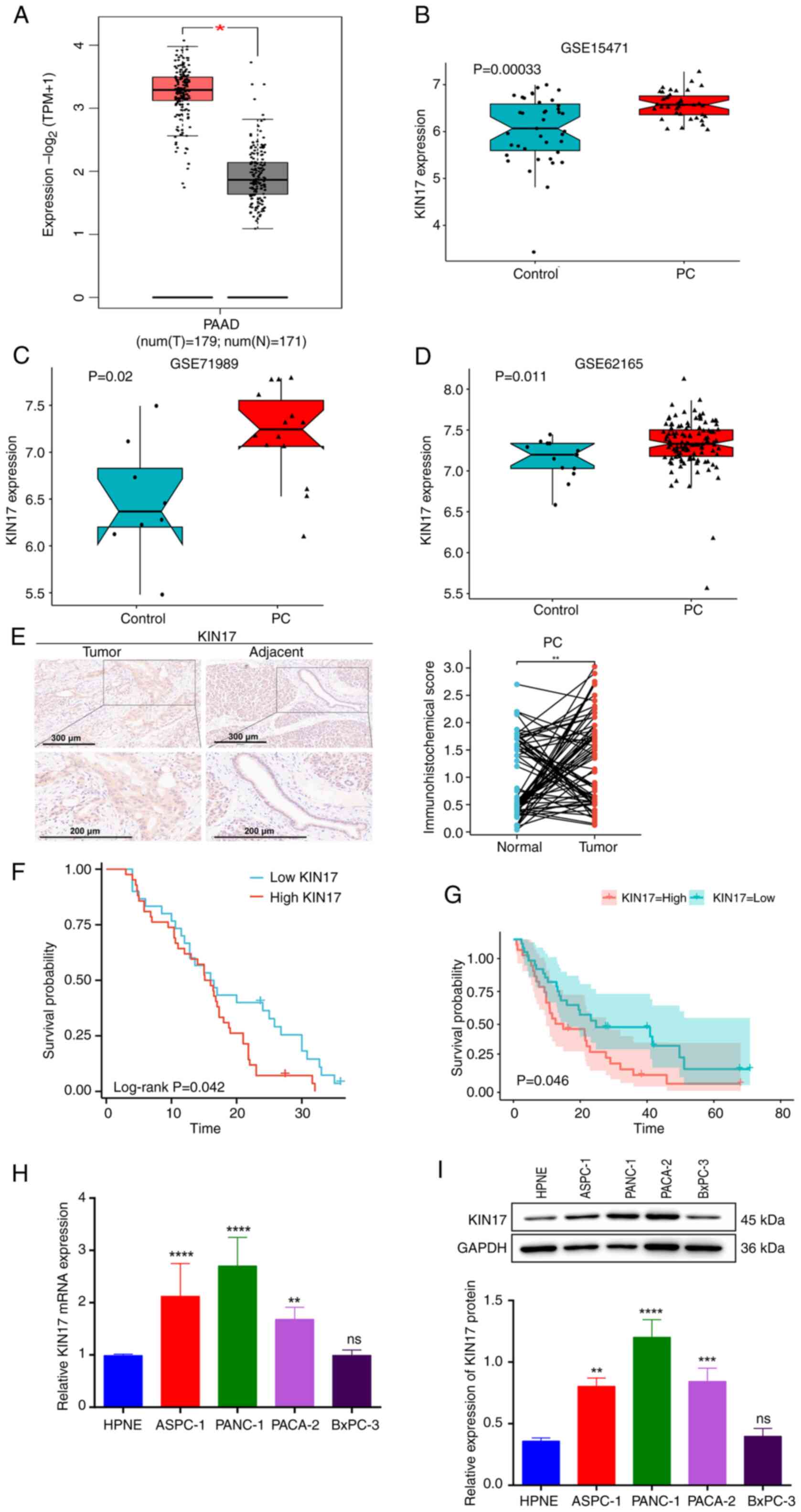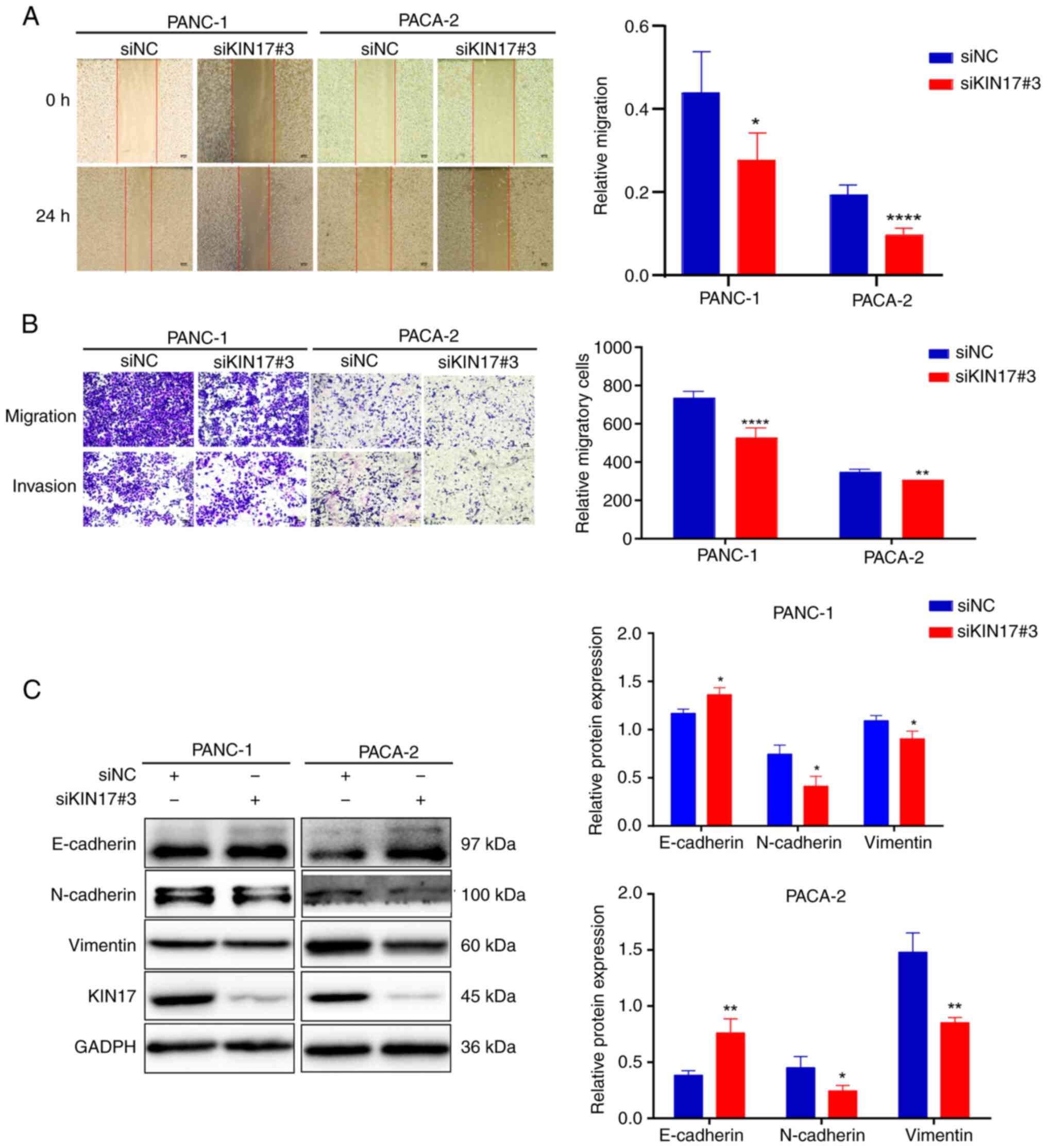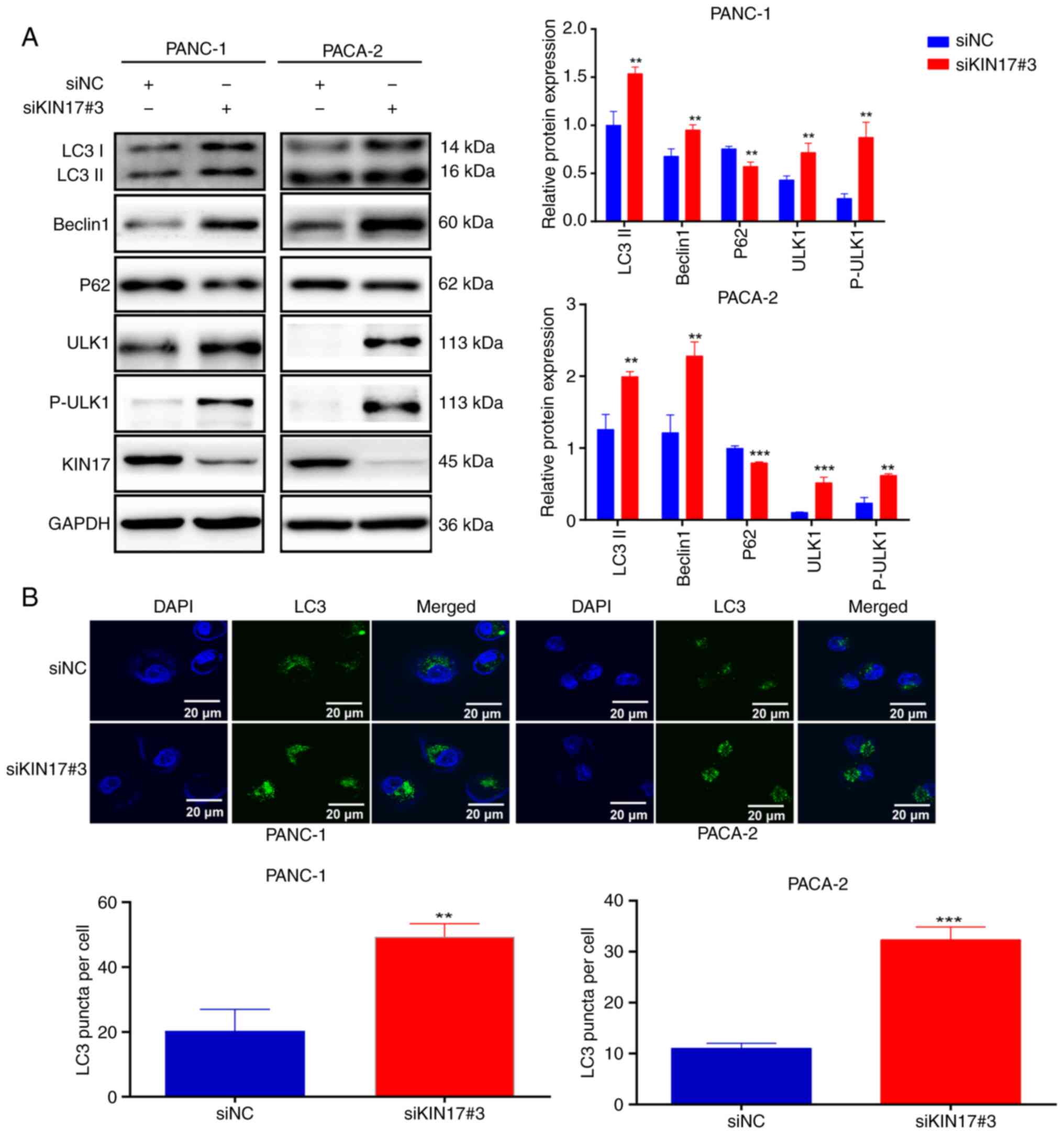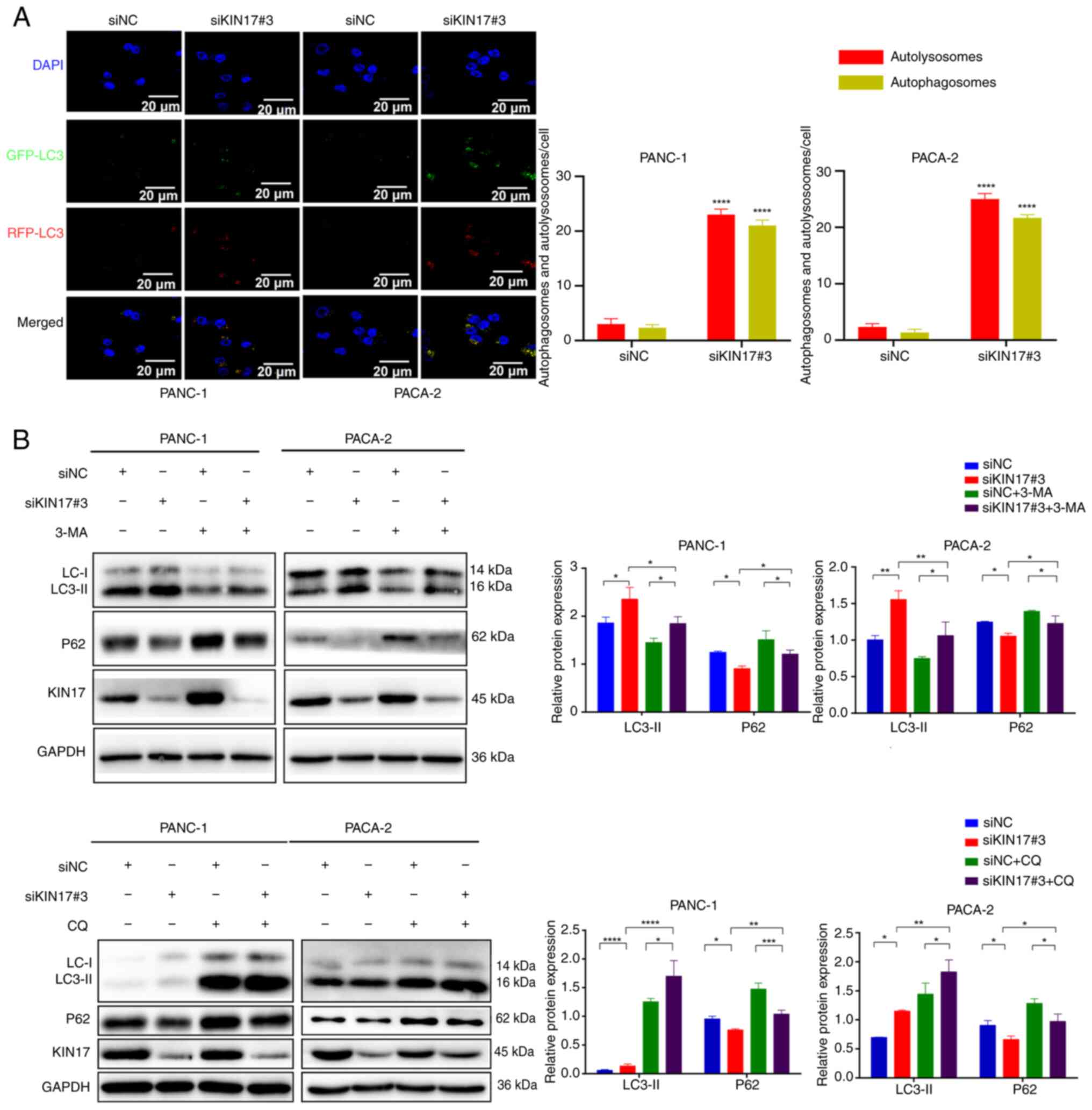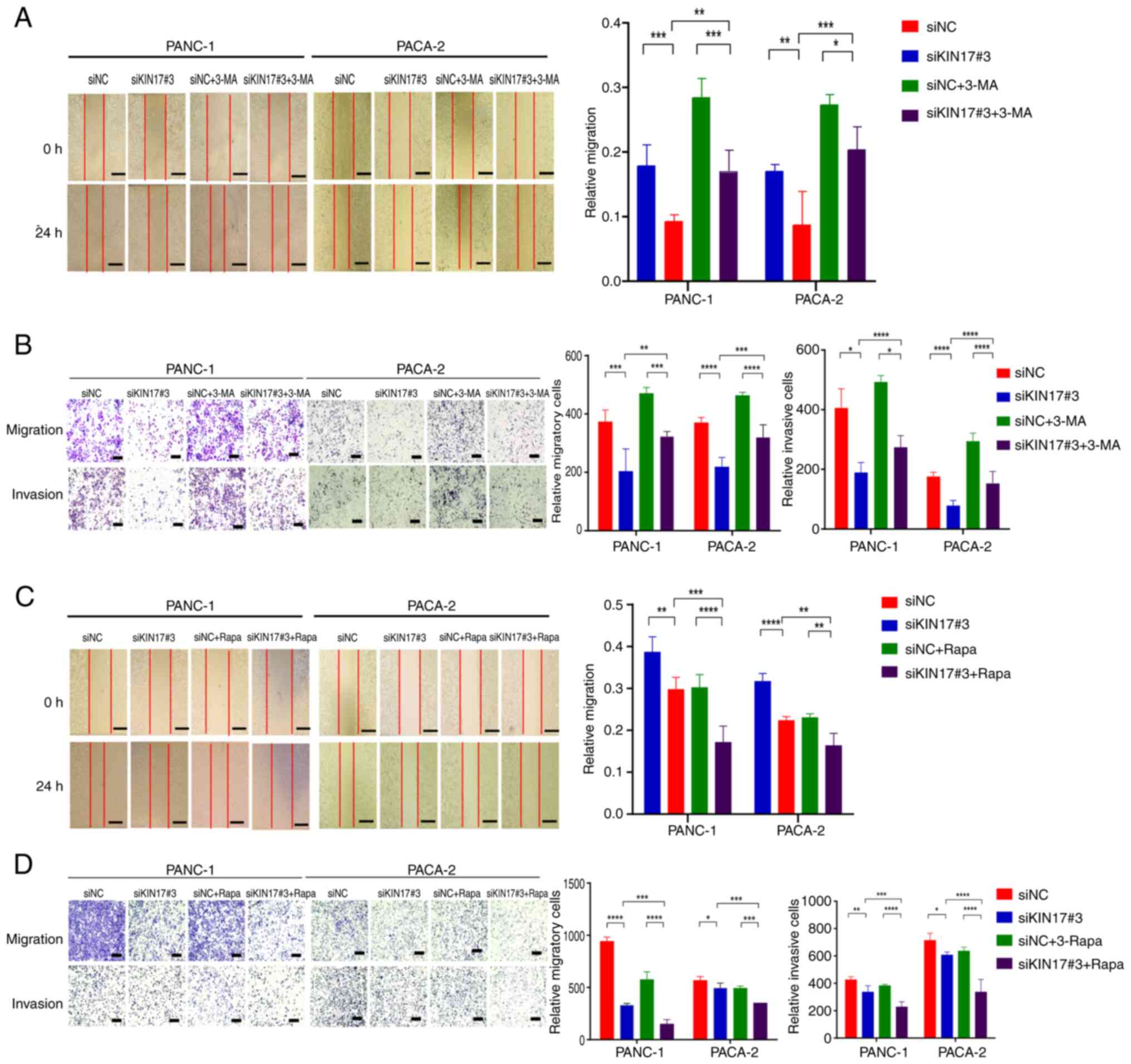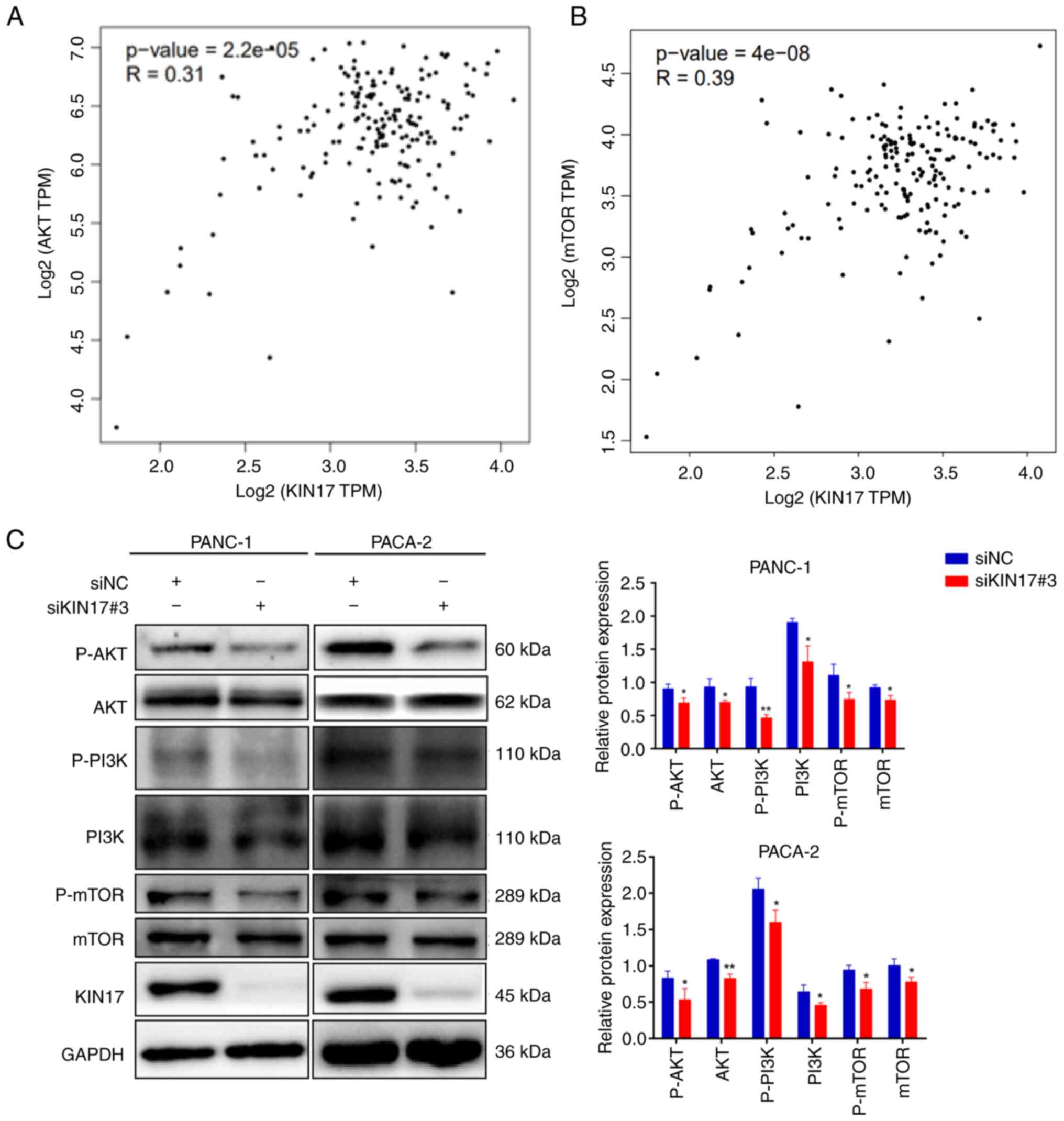|
1
|
Joshi VB, Gutierrez Ruiz OL and Razidlo
GL: The cell biology of metastatic invasion in pancreatic cancer:
Updates and mechanistic insights. Cancers (Basel). 15:21692023.
View Article : Google Scholar : PubMed/NCBI
|
|
2
|
Springfeld C, Jäger D, Büchler MW, Strobel
O, Hackert T, Palmer DH and Neoptolemos JP: Chemotherapy for
pancreatic cancer. Presse Med. 48:e159–e174. 2019. View Article : Google Scholar : PubMed/NCBI
|
|
3
|
Irajizad E, Kenney A, Tang T, Vykoukal J,
Wu R, Murage E, Dennison JB, Sans M, Long JP, Loftus M, et al: A
blood-based metabolomic signature predictive of risk for pancreatic
cancer. Cell Rep Med. 4:1011942023. View Article : Google Scholar : PubMed/NCBI
|
|
4
|
Pinon-Lataillade G, Masson C,
Bernardino-Sgherri J, Henriot V, Mauffrey P, Frobert Y, Araneda S
and Angulo JF: KIN17 encodes an RNA-binding protein and is
expressed during mouse spermatogenesis. J Cell Sci. 117((Pt 16)):
3691–3702. 2004. View Article : Google Scholar : PubMed/NCBI
|
|
5
|
Huang X, Dai Z, Li Q, Lin X, Huang Q and
Zeng T: Roles and regulatory mechanisms of KIN17 in cancers
(Review). Oncol Lett. 25:1372023. View Article : Google Scholar : PubMed/NCBI
|
|
6
|
Dai Z, Huang Q, Huang X, Zhu C, Zahid KR,
Liu T, Li Q, Wu C, Peng M, Xiao X, et al: KIN17 promotes cell
migration and invasion through stimulating the TGF-β/Smad2 pathway
in hepatocellular carcinoma. Mol Carcinog. 62:369–384. 2023.
View Article : Google Scholar : PubMed/NCBI
|
|
7
|
Huang Q, Zahid KR, Chen J, Pang X, Zhong
M, Huang H, Pan W, Yin J, Raza U, Zeng J, et al: KIN17 promotes
tumor metastasis by activating EMT signaling in luminal-A breast
cancer. Thorac Cancer. 12:2013–2023. 2021. View Article : Google Scholar : PubMed/NCBI
|
|
8
|
Heerboth S, Housman G, Leary M, Longacre
M, Byler S, Lapinska K, Willbanks A and Sarkar S: EMT and tumor
metastasis. Clin Transl Med. 4:62015. View Article : Google Scholar : PubMed/NCBI
|
|
9
|
Huang Y, Hong W and Wei X: The molecular
mechanisms and therapeutic strategies of EMT in tumor progression
and metastasis. J Hematol Oncol. 15:1292022. View Article : Google Scholar : PubMed/NCBI
|
|
10
|
Pastushenko I and Blanpain C: EMT
transition states during tumor progression and metastasis. Trends
Cell Biol. 29:212–226. 2019. View Article : Google Scholar : PubMed/NCBI
|
|
11
|
Goldsmith J, Levine B and Debnath J:
Autophagy and cancer metabolism. Methods Enzymol. 542:25–57. 2014.
View Article : Google Scholar : PubMed/NCBI
|
|
12
|
White E and DiPaola RS: The double-edged
sword of autophagy modulation in cancer. Clin Cancer Res.
15:5308–5316. 2009. View Article : Google Scholar : PubMed/NCBI
|
|
13
|
Zhou M, Xu W, Wang J, Yan J, Shi Y, Zhang
C, Ge W, Wu J, Du P and Chen Y: Boosting mTOR-dependent autophagy
via upstream TLR4-MyD88-MAPK signalling and downstream NF-κB
pathway quenches intestinal inflammation and oxidative stress
injury. EBioMedicine. 35:345–360. 2018. View Article : Google Scholar : PubMed/NCBI
|
|
14
|
Wei X, Yang J, Mao Y, Zhao H, Si N, Wang H
and Bian B: Arenobufagin inhibits the phosphatidylinositol
3-kinase/protein kinase B/mammalian target of rapamycin pathway and
induces apoptosis and autophagy in pancreatic cancer cells.
Pancreas. 49:261–272. 2020. View Article : Google Scholar : PubMed/NCBI
|
|
15
|
Qian X, Bi QY, Wang ZN, Han F, Liu LM,
Song LB, Li CY, Zhang AQ and Ji XM: Qingyihuaji Formula promotes
apoptosis and autophagy through inhibition of MAPK/ERK and
PI3K/Akt/mTOR signaling pathway on pancreatic cancer in vivo and in
vitro. J Ethnopharmacol. 307:1161982023. View Article : Google Scholar : PubMed/NCBI
|
|
16
|
Idichi T, Seki N, Kurahara H, Yonemori K,
Osako Y, Arai T, Okato A, Kita Y, Arigami T, Mataki Y, et al:
Regulation of actin-binding protein ANLN by antitumor miR-217
inhibits cancer cell aggressiveness in pancreatic ductal
adenocarcinoma. Oncotarget. 8:53180–53193. 2017. View Article : Google Scholar : PubMed/NCBI
|
|
17
|
Badea L, Herlea V, Dima SO, Dumitrascu T
and Popescu I: Combined gene expression analysis of whole-tissue
and microdissected pancreatic ductal adenocarcinoma identifies
genes specifically overexpressed in tumor epithelia.
Hepatogastroenterology. 55:2016–2027. 2008.PubMed/NCBI
|
|
18
|
Jiang J, Azevedo-Pouly AC, Redis RS, Lee
EJ, Gusev Y, Allard D, Sutaria DS, Badawi M, Elgamal OA, Lerner MR,
et al: Globally increased ultraconserved noncoding RNA expression
in pancreatic adenocarcinoma. Oncotarget. 7:53165–53177. 2016.
View Article : Google Scholar : PubMed/NCBI
|
|
19
|
Janky R, Binda MM, Allemeersch J, Van den
Broeck A, Govaere O, Swinnen JV, Roskams T, Aerts S and Topal B:
Prognostic relevance of molecular subtypes and master regulators in
pancreatic ductal adenocarcinoma. BMC Cancer. 16:6322016.
View Article : Google Scholar : PubMed/NCBI
|
|
20
|
Livak KJ and Schmittgen TD: Analysis of
relative gene expression data using real-time quantitative PCR and
the 2(−Delta Delta C(T)) method. Methods. 25:402–408. 2001.
View Article : Google Scholar : PubMed/NCBI
|
|
21
|
Akerberg D, Ansari D and Andersson R:
Re-evaluation of classical prognostic factors in resectable ductal
adenocarcinoma of the pancreas. World J Gastroenterol.
22:6424–6433. 2016. View Article : Google Scholar : PubMed/NCBI
|
|
22
|
Huang X, Dai Z, Zeng B, Xiao X, Zahid KR,
Lin X, Liu T and Zeng T: KIN17 functions in DNA damage repair and
chemosensitivity by modulating RAD51 in hepatocellular carcinoma.
Hum Cell. 37:1489–1504. 2024. View Article : Google Scholar : PubMed/NCBI
|
|
23
|
Santamaria PG, Moreno-Bueno G, Portillo F
and Cano A: EMT: Present and future in clinical oncology. Mol
Oncol. 11:718–738. 2017. View Article : Google Scholar : PubMed/NCBI
|
|
24
|
Luu T: Epithelial-mesenchymal transition
and its regulation mechanisms in pancreatic cancer. Front Oncol.
11:6463992021. View Article : Google Scholar : PubMed/NCBI
|
|
25
|
Zhang M, Liu S, Chua MS, Li H, Luo D, Wang
S, Zhang S, Han B and Sun C: SOCS5 inhibition induces autophagy to
impair metastasis in hepatocellular carcinoma cells via the
PI3K/Akt/mTOR pathway. Cell Death Dis. 10:6122019. View Article : Google Scholar : PubMed/NCBI
|
|
26
|
Zhao GS, Gao ZR, Zhang Q, Tang XF, Lv YF,
Zhang ZS, Zhang Y, Tan QL, Peng DB, Jiang DM and Guo QN: TSSC3
promotes autophagy via inactivating the Src-mediated PI3K/Akt/mTOR
pathway to suppress tumorigenesis and metastasis in osteosarcoma,
and predicts a favorable prognosis. J Exp Clin Cancer Res.
37:1882018. View Article : Google Scholar : PubMed/NCBI
|
|
27
|
Zhang J, Mao W, Liu Y, Ding J, Wang J, Yu
Z, Huang R, Yang S, Sun Y and Dong P: 3-MA enhanced
chemosensitivity in cisplatin resistant hypopharyngeal squamous
carcinoma cells via inhibiting beclin −1 mediated autophagy. Curr
Pharm Des. 27:996–1005. 2021. View Article : Google Scholar : PubMed/NCBI
|
|
28
|
Xu J, Yang KC, Go NE, Colborne S, Ho CJ,
Hosseini-Beheshti E, Lystad AH, Simonsen A, Guns ET, Morin GB and
Gorski SM: Chloroquine treatment induces secretion of
autophagy-related proteins and inclusion of Atg8-family proteins in
distinct extracellular vesicle populations. Autophagy.
18:2547–2560. 2022. View Article : Google Scholar : PubMed/NCBI
|
|
29
|
Holm TM, Bian ZC, Manupati K and Guan JL:
Inhibition of autophagy mitigates cell migration and invasion in
thyroid cancer. Surgery. 171:235–244. 2022. View Article : Google Scholar : PubMed/NCBI
|
|
30
|
Peng Y, Wang Y, Zhou C, Mei W and Zeng C:
PI3K/Akt/mTOR pathway and its role in cancer therapeutics: Are we
making headway? Front Oncol. 12:8191282022. View Article : Google Scholar : PubMed/NCBI
|
|
31
|
Wang L, Shi J, Liu S, Huang Y, Ding H,
Zhao B, Liu Y, Wang W, Yang J and Chen Z: RAC3 inhibition induces
autophagy to impair metastasis in bladder cancer cells via the
PI3K/AKT/mTOR pathway. Front Oncol. 12:9152402022. View Article : Google Scholar : PubMed/NCBI
|
|
32
|
Chen X, Zeh HJ, Kang R, Kroemer G and Tang
D: Cell death in pancreatic cancer: From pathogenesis to therapy.
Nat Rev Gastroenterol Hepatol. 18:804–823. 2021. View Article : Google Scholar : PubMed/NCBI
|
|
33
|
Ren B, Cui M, Yang G, Wang H, Feng M, You
L and Zhao Y: Tumor microenvironment participates in metastasis of
pancreatic cancer. Mol Cancer. 17:1082018. View Article : Google Scholar : PubMed/NCBI
|
|
34
|
Lu W and Kang Y: Epithelial-mesenchymal
plasticity in cancer progression and metastasis. Dev Cell.
49:361–374. 2019. View Article : Google Scholar : PubMed/NCBI
|
|
35
|
Baum B, Settleman J and Quinlan MP:
Transitions between epithelial and mesenchymal states in
development and disease. Semin Cell Dev Biol. 19:294–308. 2008.
View Article : Google Scholar : PubMed/NCBI
|
|
36
|
Dongre A and Weinberg RA: New insights
into the mechanisms of epithelial-mesenchymal transition and
implications for cancer. Nat Rev Mol Cell Biol. 20:69–84. 2019.
View Article : Google Scholar : PubMed/NCBI
|
|
37
|
Dardare J, Witz A, Merlin JL, Bochnakian
A, Toussaint P, Gilson P and Harle A: Epithelial to mesenchymal
transition in patients with pancreatic ductal adenocarcinoma:
State-of-the-art and therapeutic opportunities. Pharmaceuticals
(Basel). 14:7402021. View Article : Google Scholar : PubMed/NCBI
|
|
38
|
Debaugnies M, Rodriguez-Acebes S, Blondeau
J, Parent MA, Zocco M, Song Y, de Maertelaer V, Moers V, Latil M,
Dubois C, et al: RHOJ controls EMT-associated resistance to
chemotherapy. Nature. 616:168–175. 2023. View Article : Google Scholar : PubMed/NCBI
|
|
39
|
Lengrand J, Pastushenko I, Vanuytven S,
Song Y, Venet D, Sarate RM, Bellina M, Moers V, Boinet A, Sifrim A,
et al: Pharmacological targeting of netrin-1 inhibits EMT in
cancer. Nature. 620:402–408. 2023. View Article : Google Scholar : PubMed/NCBI
|
|
40
|
Joshi PJ, Chawla A, Memari P, Stansfi J,
Idowu M, Sima AP and Grossman SR: Role of C terminal binding
proteins (CtBP) in pancreatic adenocarcinoma (PDAC). J Clin Oncol.
36 (Suppl 4):S3202018. View Article : Google Scholar
|
|
41
|
Castellanos JA, Merchant NB and
Nagathihalli NS: Emerging targets in pancreatic cancer:
Epithelial-mesenchymal transition and cancer stem cells. Onco
Targets Ther. 6:1261–1267. 2013.PubMed/NCBI
|
|
42
|
Tao J, Yang G, Zhou W, Qiu J, Chen G, Luo
W, Zhao F, You L, Zheng L, Zhang T and Zhao Y: Targeting hypoxic
tumor microenvironment in pancreatic cancer. J Hematol Oncol.
14:142021. View Article : Google Scholar : PubMed/NCBI
|
|
43
|
Wong CH, Lou UK, Fung FK, Tong JHM, Zhang
CH, To KF, Chan SL and Chen Y: CircRTN4 promotes pancreatic cancer
progression through a novel CircRNA-miRNA-lncRNA pathway and
stabilizing epithelial-mesenchymal transition protein. Mol Cancer.
21:102022. View Article : Google Scholar : PubMed/NCBI
|
|
44
|
Zheng X, Carstens JL, Kim J, Scheible M,
Kaye J, Sugimoto H, Wu CC, LeBleu VS and Kalluri R:
Epithelial-to-mesenchymal transition is dispensable for metastasis
but induces chemoresistance in pancreatic cancer. Nature.
527:525–530. 2015. View Article : Google Scholar : PubMed/NCBI
|
|
45
|
Amaravadi R, Kimmelman AC and White E:
Recent insights into the function of autophagy in cancer. Genes
Dev. 30:1913–1930. 2016. View Article : Google Scholar : PubMed/NCBI
|
|
46
|
Qiang L, Zhao B, Ming M, Wang N, He TC,
Hwang S, Thorburn A and He YY: Autophagy regulates tumor growth and
metastasis. bioRxiv. Nov 3–2023.(Epub ahead of print). doi:.
https://doi.org/10.1101/2023.10.31.564991
|
|
47
|
Wu J, Chen X, Liu X, Huang S, He C, Chen B
and Liu Y: Autophagy regulates TGF-β2-induced
epithelial-mesenchymal transition in human retinal pigment
epithelium cells. Mol Med Rep. 17:3607–3614. 2018.PubMed/NCBI
|
|
48
|
Zhu H, Gan X, Jiang X, Diao S, Wu H and Hu
J: ALKBH5 inhibited autophagy of epithelial ovarian cancer through
miR-7 and BCL-2. J Exp Clin Cancer Res. 38:1632019. View Article : Google Scholar : PubMed/NCBI
|
|
49
|
Mortazavi M, Moosavi F, Martini M,
Giovannetti E and Firuzi O: Prospects of targeting PI3K/AKT/mTOR
pathway in pancreatic cancer. Crit Rev Oncol Hematol.
176:1037492022. View Article : Google Scholar : PubMed/NCBI
|
|
50
|
Stanciu S, Ionita-Radu F, Stefani C,
Miricescu D, Stanescu S II, Greabu M, Ripszky Totan A and Jinga M:
Targeting PI3K/AKT/mTOR signaling pathway in pancreatic cancer:
From molecular to clinical aspects. Int J Mol Sci. 23:101322022.
View Article : Google Scholar : PubMed/NCBI
|
|
51
|
Mohite R and Doshi G: Elucidation of the
role of the epigenetic regulatory Mechanisms of PI3K/AKT/mTOR
signaling pathway in human malignancies. Curr Cancer Drug Targets.
24:231–244. 2024. View Article : Google Scholar : PubMed/NCBI
|
|
52
|
Gao W, Guo H, Niu M, Zheng X, Zhang Y, Xue
X, Bo Y, Guan X, Li Z, Guo Y, et al: circPARD3 drives malignant
progression and chemoresistance of laryngeal squamous cell
carcinoma by inhibiting autophagy through the PRKCI-Akt-mTOR
pathway. Mol Cancer. 19:1662020. View Article : Google Scholar : PubMed/NCBI
|
|
53
|
Sun X, Shu Y, Xu M, Jiang J, Wang L, Wang
J, Huang D and Zhang J: ANXA6 suppresses the tumorigenesis of
cervical cancer through autophagy induction. Clin Transl Med.
10:e2082020. View Article : Google Scholar : PubMed/NCBI
|
|
54
|
Zheng X, Li W, Xu H, Liu J, Ren L, Yang Y,
Li S, Wang J, Ji T and Du G: Sinomenine ester derivative inhibits
glioblastoma by inducing mitochondria-dependent apoptosis and
autophagy by PI3K/AKT/mTOR and AMPK/mTOR pathway. Acta Pharm Sin B.
11:3465–3480. 2021. View Article : Google Scholar : PubMed/NCBI
|
|
55
|
Dai H, Hu W, Zhang L, Jiang F, Mao X, Yang
G and Li L: FGF21 facilitates autophagy in prostate cancer cells by
inhibiting the PI3K-Akt-mTOR signaling pathway. Cell Death Dis.
12:3032021. View Article : Google Scholar : PubMed/NCBI
|
|
56
|
Wei R, Xiao Y, Song Y, Yuan H, Luo J and
Xu W: FAT4 regulates the EMT and autophagy in colorectal cancer
cells in part via the PI3K-AKT signaling axis. J Exp Clin Cancer
Res. 38:1122019. View Article : Google Scholar : PubMed/NCBI
|
|
57
|
Farhan M, Silva M, Xingan X, Zhou Z, Zheng
W and Ciriolo MR: Artemisinin inhibits the migration and invasion
in uveal melanoma via inhibition of the PI3K/AKT/mTOR signaling
pathway. Oxid Med Cell Longev. 2021:99115372021. View Article : Google Scholar : PubMed/NCBI
|
|
58
|
Yang H, Li Z, Wang Z, Zhang X, Dai X, Zhou
G and Ding Q: Histocompatibility minor 13 (HM13), targeted by
miR-760, exerts oncogenic role in breast cancer by suppressing
autophagy and activating PI3K-AKT-mTOR pathway. Cell Death Dis.
13:7282022. View Article : Google Scholar : PubMed/NCBI
|
|
59
|
Nie S, Qian X, Shi M, Li H, Peng C, Ding
X, Zhang S, Zhang B, Xu G, Lv Y, et al: ALDH1A3 accelerates
pancreatic cancer metastasis by promoting glucose metabolism. Front
Oncol. 10:9152020. View Article : Google Scholar : PubMed/NCBI
|
|
60
|
Huang L, Sun J, Ma Y, Chen H, Tian C and
Dong M: MSI2 regulates NLK-mediated EMT and PI3K/AKT/mTOR pathway
to promote pancreatic cancer progression. Cancer Cell Int.
24:2732024. View Article : Google Scholar : PubMed/NCBI
|
|
61
|
Shao Q, Zhang Z, Cao R, Zang H, Pei W and
Sun T: CPA4 promotes EMT in pancreatic cancer via stimulating
PI3K-AKT-mTOR signaling. Onco Targets Ther. 13:8567–8580. 2020.
View Article : Google Scholar : PubMed/NCBI
|















